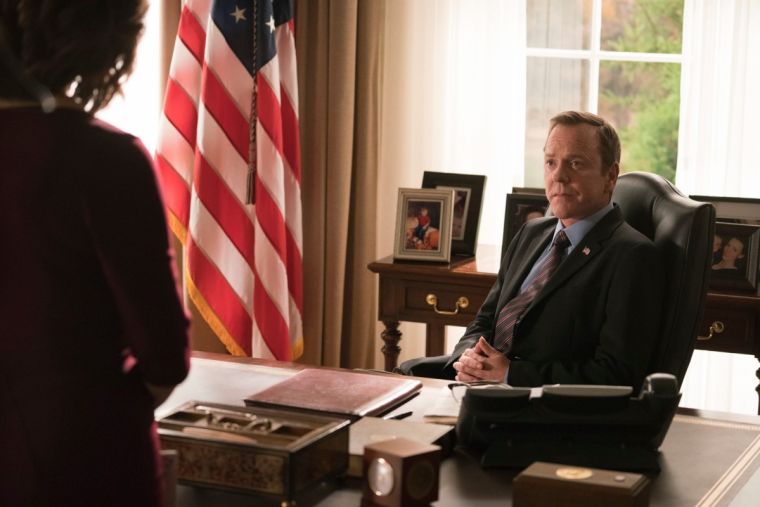The (new) Trump TV show: Why politics is always crying out for a king
Wednesday brought the harrowing news that the now infamous book 'Fire and Fury' is being made into a TV show. Michael Wolff's bestselling Washington tell-all supposedly tells the real behind-the-scenes truth about the Donald Trump presidency, in case its absurdity wasn't evident enough already. Trump hates it of course, insisting it's a bunch of 'boring' lies, written by a 'total loser'.
Nonetheless, the TV rights for the book have been sold, so Donald can be expected to grace the small screen in not too long. Again.
It's surely terrifying news for anyone already maddened by the president's ubiquitous presence in the media. Now you'll get double your Trump for your money, in somehow even more dramatic form, and this after just one year of his being in office.
Then again, a hit-TV show centred around the Oval Office is no new thing. Consider perhaps the most beloved of all TV presidents: the smart, dignified and thoroughly human Jed Bartlett (played inimitably by Martin Sheen) of West Wing fame. He and his staff were famously optimistic, embracing an early noughties 'anything's possible' philosophy,insisting that partisanship and power-plays didn't have to define politics. It was unashamedly pro-Democrat, with furious Republicans frequently drafted in as the baddies, though the show made room for nuance on that at times as well.
It was impeccably witty, intelligent and somehow drew profound drama from the frequently mundane mechanics of politics. Its optimism is well captured in a popular catchphrase from the President: 'What's next?' When the show finished, it was soon followed by the real-world election of Barack Obama, seemingly fulfilling the show's upward gaze. Anything's possible, right?
Then you've got Netflix's House of Cards – a US remake of an originally British classic – which took all your noble optimism and literally threw it in front of a train. You follow the villain here, not a hero, a scheming manipulator who backstabs his way from relative political unknown to the Oval Office. It's all about the relentless pursuit of power and its corrupting influence. The few virtuous characters and their pursuit of 'the truth' seem to be set up only to be crushed. It's impressive drama, but also relentlessly bleak. Relative to US politics, it might be seen in parallel to the disillusionment that came to surround the once-optimistic Obama administration. As Andy Walton explains, House of Cards ditched naivety for nihilism. Its star Kevin Spacey has now been embroiled in numerous sexual abuse allegations, eerily bringing a darker tone to an already sombre story.
In the past couple of years we've seen a surprising swing back to a kind of earnestness perhaps tired of the cynicism of House of Cards, now yearning for hope again. Designated Survivor is based on the absurd premise that a man with woeful political inexperience (played by the hardy Kiefer Sutherland) is suddenly thrust into the position of US president. Can you imagine!

The show starts grim: all the political structures/representatives of the US government are wiped out in one brutal terrorist attack, leaving the 'designated survivor' to step up to the presidential plate. But its soon the cheesiest, most politically optimistic, searingly sentimental politics show you've ever seen. The President is a principled independent who sees the best in everyone. An extremely cultish version of the alt-right play the villains. It's a far cry from the high-calibre of the West Wing, but is nonetheless great, quite addictive and endearing fun in its own way.
These three presidents each represent a vision for leadership: they're fictional, but they are what we see or want-to-see from our real-life politics. We're pretty sure that the figure in the Oval Office really does make all the difference. The modern-day presidency isn't unlike a kind of elected Kingship.
With that in mind though, it's worth noting that the Bible isn't all that fond of kings. In the Old Testament, God reluctantly concedes Israel's demand for a king, but advises against it. There were good (relatively) kings like David, but tyrants too, and Scripture remains ambivalent on whether as a political structure it's really ideal. Its not hard to think why: concentrated power leads to concentrated corruption, enables dictatorships, takes responsibility away from the people. Ultimately it's theological: the human desire for a king is seen as the implicit rejection of God as king.
That more suspicious vision, wary of centralised power and 'saviour' politicians, seems helpful for today's political scene. There's plenty of cynicism, which needs to be affirmed insofar as it faces the truth of human nature, but rejected insofar as it extinguishes hope, the kind of enduring, supernatural hope that God promises can be seen on Earth. There's idealism to applaud, hope can be reclaimed, but that needs to be checked so that it doesn't become a dogmatic allegiance to the next political Messiah.
The Fire and Fury show will add another TV president to the mix, though perhaps one too many, and one eerily familiar to the Trump on the news. But maybe that's a good reminder that presidents, TV or otherwise, can't save the world. Kings are overrated.
You can follow @JosephHartropp on Twitter











